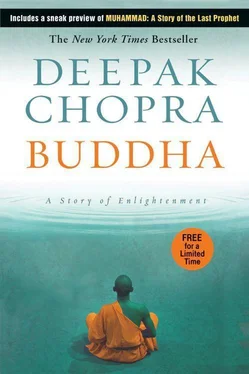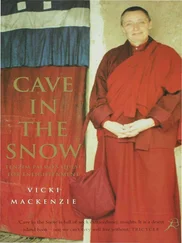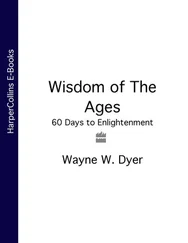With the audience gone, Suddhodana could speak freely. “Is all that you said true? Is there nothing I can do?”
“No matter what I say, you will do it anyway.” Without reproof, Asita began to leave, only to be held back once more.
“Tell me just one thing. Why did you weep tears when you saw my son?” asked Suddhodana.
“Because I will not live long enough to hear the immortal truth that Buddha will speak,” Asita said.
The next morning Suddhodana rode his warhorse up the hillside toward the imposing Shiva temple his father had built on the crest. The king’s melancholy had changed overnight, replaced by determination. A score of bullock carts were gathered outside the temple gates, the great patient beasts searching lazily for grass sprouting from the earth packed hard by the sandals of devotees.
Suddhodana dismounted and let his horse graze with the bullocks. He strode into the main temple courtyard, which was filled with milling worshippers and sellers of sandalwood and ghee for ritual offerings. Awed eyes followed his progress, but Suddhodana had no time for ceremony. He had ridden without an entourage because he had a secret purpose in mind; he didn’t summon Canki to the palace because he was too impatient to wait for him.
Now he burst into the inner sanctum, where the air was a heavy, sweet-smelling pall. A lone priest was performing the ritual Rudravishek. Slowly he poured ladles of milk over a tall polished stone, the Shiva lingam. The liquid left a faint blue veil on the ancient river rock. In the darkness Suddhodana’s eyes narrowed; they stung from the residue of pitch and incense hanging in the air.
“Canki!”
The priest stopped the oblation and turned toward the bellowing voice. The king’s eyesight had adjusted, and he recognized the high Brahmin himself at the altar. Some rich devotee, probably marrying a third or fourth wife, had paid handsomely for the ceremony.
After a glance Canki turned back to his task. “I’m not finished yet,” he said.
The king came up and seized the ladle from his hands. “You are now.”
Canki bowed, then led the king away, padding silently over the stone floor on bare feet. He was quite capable of defying royalty, protected by his Brahmin privilege. Canki was solid and imposing, despite the rolls of fat exposed as he went, bare-chested, across the cobbled courtyard toward the cloister where the monks lived. The Brahmin lowered his heavy body onto a leather stool inside his cell, pointedly not waiting for the king to take a seat first. Suddhodana let the insult pass. “If you talk to God, you already know why I’m here,” he said.
“I know that God wishes to please you in every way, Your Highness.” Canki gave a fawning smile meant to win over an angry king.
“I want my son to rule the world.” Suddhodana said the words without hesitation. “Is this possible?”
“Every father would want-”
Suddhodana stepped closer, magnifying the threat he posed. “No! Either this is God’s will or it’s not. You are to tell me. Much rests on this. More than your life, in fact.”
The balance between castes was delicate. If the rulers had a political reason to support religion, they did; if the priests needed to bring the people under their sway, they exerted influence over the rulers by promises of divine favor. Canki knew the system very well, and he also knew, despite his high caste, whose hand rested on the sword.
He said, “You face many obstacles in this endeavor, Your Highness. But it can be done.”
“How?”
“Seek to control the infant prince’s mind. He must be taught to think like you. To believe like you. And to lust as you lust.”
This last was a barb, but Suddhodana waited patiently, hearing truth in the Brahmin’s words. If anyone knew how to control others’ minds, Canki did.
“Train him well, as a complete warrior. Place his whole sense of worth on fighting, and on you.” Canki paused. “Am I helping?”
Suddhodana realized at that moment why the jyotishis had been so nervous. They had consulted the high Brahmin as soon as they cast Siddhartha’s chart. No doubt they could foretell the king’s displeasure.
“Is that all I have to do?” Suddhodana’s tone was cutting; they both knew his suspicion toward priests.
“No. The most difficult part comes last.” Canki went to the window and pointed outside at a large stone statue of Shiva. “I am reminded of Lord Shiva’s story. You know it, of course.” This was another barb; the Brahmin continued without waiting for a reply.
“Venerable sages had gathered in the forest to meditate, and Lord Shiva desired to learn from them. But he was mischievous, and he brought a woman with him to their retreat. This was a test, for the woman was actually Lord Vishnu in disguise. But the sages were too blinded with rage to see this. They vowed to kill this sacrilegious intruder, so from the sacred fire they engendered a monstrous tiger. The beast leaped upon Shiva, but with one fingernail he stripped the tiger of his skin and wrapped it around his shoulders. Then he thanked the sages for their courtesy in supplying him with a meditation cloak.
“The sages’ fury redoubled after this impudence. The sacred fire absorbed their rage, and a second monster sprang out, this time an enormous serpent. But Shiva choked it with his hands and wrapped the carcass around his neck. He thanked the sages for providing him with a necklace. At that point they grew so furious that a third monster sprang from the fire-”
“Stop!” Suddhodana’s patience had reached its limit. “If you think what I must do is too difficult, spare me your parables. Just tell me outright.”
“Make your son a total prisoner.”
The starkness of these words hit Suddhodana in his chest like a rock. Canki read his dismay and hurried on.
“This is a soul whose spiritual tendencies will be almost uncontrollable, and your only chance is when the boy is young. To make Siddhartha into a great king, never let him leave these walls,” the high Brahmin said. “He must believe this is a paradise. If he once sees suffering, your son will never obey you again. You’ll lose him forever.”
Suddhodana was stunned. “For how long must I do this?”
“Thirty-two years.”
“And there’s no other way?” The king had become extremely deliberate, as if weighing a death sentence. It revolted him to think that he had acquired a conspirator. Someone who had power over him from this day on. He felt smothered by the rage and helplessness whirling inside him.
Involuntarily his sword arm moved, and the next instant he had the Brahmin pinned to the floor with the edge of his blade. “You think you’ve achieved something today? Then remember the rest of Shiva’s story. Out of the sacred fire leaped a third monster, a hideous dwarf. Shiva pounced upon it and held its throat under his heels, crushing it. Who was that dwarf?”
“Ignorance.” Canki choked out the word.
“Don’t prey upon my ignorance, then. I know more than you suppose.” The king released the priest from underfoot. Suddhodana’s nature couldn’t be held in check. It was only tempered by this gnawing desire, only a day old but gripping at his spleen, to father the ruler of the world.
He departed with one last word for Canki. “Just be sure that you live long enough to see what I’ll do with you if this plan fails.”
Within the hour the king issued orders, dispersing his own people and banishing them from his city. His son would never be allowed to see suffering in any form-sickness, aging, or dying. Standing on the ramparts of the castle, he could see long trains of wagons leaving Kapilavastu. The rains had already come in torrents that washed away crops and flooded houses. Those least likely to survive were the old and sick. Lepers were hunched against the rain wrapped in dirty rags to cover their faces. Cripples who could not walk the roads were tossed wholesale into supply wagons from the army, with soldiers ordered to drive them far away and dump them in remote villages. The oldest were sole survivors, and these were thrown into separate army wagons. They were told that homes awaited them in a better place, a cruel way of hinting at the reality-they would be abandoned in the forest a day away.
Читать дальше












